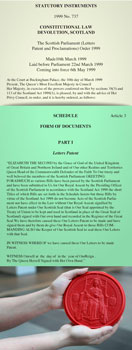2.5 Interpretation and Legislative Reform (Scotland) Act 2010
In January 2009 the Scottish Government issued a consultation paper in relation to a number of technical procedures, including those for making secondary legislation and for interpreting Acts. The consultation paper noted that the Renton Committee 1975 report stated ‘A general Interpretation Act can help to shorten and simplify particular Acts of Parliament, to clarify their effects by enacting rules of construction, and to standardise common-form provisions’. The Interpretation and Legislative Reform (Scotland) Bill aimed to achieve this and the subsequent Act defines a number of words and expressions that are commonly used in legislation.
Box 5 Extract from Schedule 1 of Interpretation and Legislative Reform (Scotland) Act 2010
Meaning of words and expressions used in legislation
22 Number
- In an Act of the Scottish Parliament or a Scottish instrument—
- (a) words in the singular include the plural
- (b) words in the plural include the singular.
23 References to time of day
- (1) An expression of time that occurs in an Act of the Scottish Parliament or a Scottish instrument is to be read as a reference to Greenwich mean time.
- (2) Subsection (1) is subject to section 3 of the Summer Time Act 1972 (c. 6) (construction of references to points of time during the period of summer time).
24 Meaning of words and expressions used in instruments
A word or expression used in a Scottish instrument has the same meaning as it has in the Act of the Scottish Parliament by virtue of which the instrument is made.
25 Definitions
- (1) In an Act of the Scottish Parliament or a Scottish instrument words and expressions listed in schedule 1 are to be construed according to that schedule.
- (2) The Scottish Ministers may by order modify that schedule.
- (3) An order under this section is subject to the affirmative procedure.
Schedule 1 of the Interpretation and Legislative Reform (Scotland) Act 2010 supplies definitions of commonly used words and expressions which are used frequently in Acts of the Scottish Parliament and Scottish instruments – they are seen to pass the ‘frequent use’ test.
Box 6 Extract from Schedule 1 of Interpretation and Legislative Reform (Scotland) Act 2010
- “financial year” means a year ending with 31 March,
- “functions” includes powers and duties; and “confer”, in relation to functions, includes impose,
- “High Court” means the High Court of Justiciary,
- “land” includes buildings and other structures, land covered with water, and any right or interest in or over land,
- “Lands Clauses Acts” means the Lands Clauses Consolidation (Scotland) Act 1845 (c. 19) and the Lands Clauses Consolidation Acts Amendment Act 1860 (c. 106), and any Acts for the time being in force amending those Acts,
- “local authority” means a council constituted under section 2 of the Local Government etc. (Scotland) Act 1994 (c. 39), and “area” in relation to a local authority, means the local government area for which the authority is constituted,
- [F2“marriage” means marriage between persons of different sexes and marriage between persons of the same sex (and any reference to a person being (or having been) married to another person, or to two people being (or having been) married to each other, is to be read accordingly),]
- “member of the Scottish Executive” has the same meaning as in section 44(1) of the Scotland Act 1998 (c. 46),
- “modify” includes amend or repeal,
- “month” means calendar month,
- “oath” and “affidavit” include affirmation and declaration; and “swear” includes affirm and declare,
- “ordnance map” means a map made under powers conferred by the Ordnance Survey Act 1841 (c. 30),
- “person” includes a body of persons corporate or unincorporated and a partnership constituted under the law of Scotland,
UK Parliament Acts (and the delegated legislation made under them) are subject to the interpretation provisions in the Interpretation Act 1978 (the 1978 Act). Acts of the Scottish Parliament (ASPs) before 2010 continue to be subject to the 1978 Act, even if they have been amended by subsequent acts of the Scottish Parliament (or subordinate legislation made under them).
If there is no interpretation section and a general interpretation Act does not apply, then the courts, if asked to determine the meaning of a word in legislation, will apply one of the rules of statutory interpretation to determine the meaning of that word.

